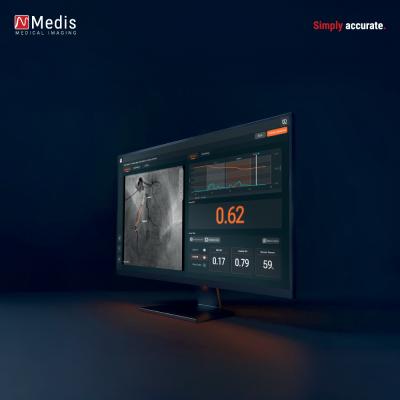
May 14, 2024 — GE HealthCare, a leading global medical technology, pharmaceutical diagnostics and digital solutions innovator, and Medis Medical Imaging, a leading cardiac imaging software company, announced their collaboration aimed at helping advance precision care in the diagnosis and treatment of coronary artery disease (CAD). Together, the two companies will work to further the development and commercialization of Medis Quantitative Flow Ratio (Medis QFR), a non-invasive approach to the assessment of coronary physiology, as part of GE HealthCare’s interventional cardiology portfolio built around the Allia Platform. The collaboration seeks to provide access to emerging technologies, like Medis QFR, while also reducing complexity in the cath lab to improve the operating environment for clinicians.
Within the complex umbrella of cardiovascular disease, CAD is a type of heart disease that develops when the coronary arteries narrow and the heart cannot deliver enough oxygen-rich blood to the heart. The impact of this narrowing can ultimately result in angina (chest pain), which has been shown to double the risk of major cardiovascular events,1 as well as myocardial infarction (heart attack) or even death. In order to accurately diagnose suspected CAD, a significant percentage of patients can undergo invasive coronary angiography to help clinicians determine the severity of their disease. Traditionally, a clinician will then visually interpret an angiogram to determine whether a patient requires treatment, such as a percutaneous coronary intervention (PCI), as well as determine where, or which lesion, to treat to restore blood flow.
As part of GE HealthCare’s commitment to advancing precision care in interventional cardiology, the company’s collaboration with Medis Medical Imaging will bring Medis QFR to clinicians as an emerging, non-invasive, image-based diagnostic approach to the assessment of coronary artery physiology and the treatment of CAD. The benefits of QFR guidance are supported in a recent study that showed that a QFR-guided strategy of lesion selection for PCI improved two-year clinical outcomes, including reduction in myocardial infraction and ischemia-driven revascularization, when compared with standard angiography guidance alone.2
“We continue to see an evolution in how clinicians work to treat cardiovascular disease and want to give clinicians the tools, along with the flexibility and adaptability, they need to enable better outcomes for their patients,” says Arnaud Marie – General Manager for Global Intervention at GE HealthCare. “In the assessment of coronary artery disease, QFR represents a significant advancement in how efficiently it can provide critical insights. We’re excited to collaborate with Medis Medical Imaging to add innovative, non-invasive, image-based QFR to our portfolio of offerings around our Allia IGS platform to streamline the experience for clinicians and help us to deliver on our vision for the future image-guided therapy.”
Medis Medical Imaging has been developing innovative post-processing software for the quantification of cardiovascular images for thirty-five years. Medis’ QFR is a proprietary solution that delivers image-based physiology of coronary obstructions based on angiography imaging analysis alone. Interventional cardiologists can seamlessly adopt the solution into their clinical workflow to help them effectively and efficiently determine if a PCI is required to treat the patient or if treatment should be deferred for ongoing monitoring or other alternative treatment options. If treatment is needed, Medis’ QFR technology can help clinicians select the ultimate lesion(s) for treatment and create the right treatment plan for a balloon or stent-based PCI procedure, while also helping the clinician evaluate the efficacy of that treatment. This analysis can be performed in real time while the patient is on the table and results are displayed on the large display monitor in the cath lab.
“We are absolutely delighted to be taking this next step with GE HealthCare, a fellow leader in the interventional cardiology domain,” shares Maya Barley, CEO Medis Medical Imaging. “Building on Medis QFR’s decade of AI research, customer-focused product development, clinical evidence generation and business development, we are excited to be able to further accelerate our efforts around Medis QFR to enable more hospitals and clinicians to apply physiology in day-to-day interventional practice a part of best-practice clinical care – making this technology more accessible and available to patients than ever before.”
Innovative technologies like Medis QFR enhance GE HealthCare’s comprehensive portfolio of interventional cardiology solutions built around the Allia Platform designed to optimize workflows, unlock efficiencies, and drive better patient outcomes in the treatment of cardiovascular disease.
To learn more about GE HealthCare’s latest innovations in interventional cardiology including Allia IGS Pulse, the next generation of image-guided systems for cardiac imaging, or Medis QFR, please visit the EuroPCR 2024 congress booth #F15 in Paris, France from May 14 – 17 or visit the website here.
For more information: www.gehealthcare.com
References:
1 World Health Federation. Use Heart to Act on Angina. Available at: https://world-heart-federation.org/use-heart-to-act-now-on-angina/. Accessed May 2024.
2 Lei Song, Bo Xu, Shengxian Tu, Changdong Guan, Zening Jin, Bo Yu, Guosheng Fu, Yujie Zhou, Jian’an Wang, Yundai Chen, Jun Pu, Lianglong Chen, Xinkai Qu, Junqing Yang, Xuebo Liu, Lijun Guo, Chengxing Shen, Yaojun Zhang, Qi Zhang, Hongwei Pan, Rui Zhang, Jian Liu, Yanyan Zhao, Yang Wang, Kefei Dou, Ajay J. Kirtane, Yongjian Wu, William Wijns, Weixian Yang, Martin B. Leon, Shubin Qiao, Gregg W. Stone, 2-Year Outcomes of Angiographic Quantitative Flow Ratio-Guided Coronary Interventions, Journal of the American College of Cardiology, Volume 80, Issue 22, 2022, Pages 2089-2101, ISSN 0735-1097, https://doi.org/10.1016/j.jacc.2022.09.007.


 January 28, 2026
January 28, 2026 









